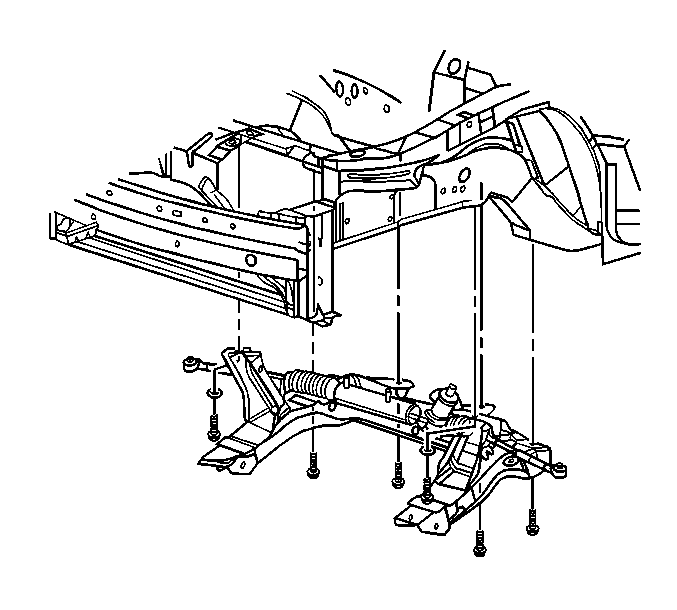For 1990-2009 cars only
Removal Procedure
- Raise the vehicle on a hoist. Refer to Lifting and Jacking the Vehicle in General Information.
- Remove the tire and wheel assemblies. Refer to Tire and Wheel Removal and Installation in Tires and Wheels.
- Remove the front fender liners. Refer to Front Fender Liner Replacement in Body Front End.
- Remove the engine strut from the lower engine mount and frame. Refer to Engine Mount Strut Replacement in Engine Mechanical-2.2L (L61) .
- Remove the front exhaust pipe. Refer to Intermediate Pipe Replacement in Engine Exhaust.
- Disconnect the antilock brake system (ABS) harness from the lower control arms. Refer to Front Wheel Speed Sensor Replacement in Antilock Brake System.
- Remove the ball joints from the steering knuckles. Refer to Stabilizer Shaft Replacement .
- Remove the tie rods from the steering knuckles. Refer to Rack and Pinion Outer Tie Rod End Replacement in Power Steering System.
- On vehicles with a brake pipe running along the support frame, remove the brake pipe from the retainers.
- Remove the power steering gear mounting bolts and secure out of the way using mechanic's wire or equivalent, being sure not to overextend the intermediate shaft. Refer to Steering Gear Replacement .
- Remove the front suspension support brace. Refer to Front Suspension Support Brace Replacement .
- Lower the vehicle until the front suspension crossmember rests on jack stands.
- Remove the front suspension crossmember mounting bolts.
- Raise the vehicle off of the front suspension crossmember.
- Remove the following components if replacing the front suspension crossmember:

| • | The lower control arms -- Refer to Lower Control Arm Replacement in Front Suspension. |
| • | The power steering gear -- Refer to Steering Gear Replacement in Power Steering System. |
Installation Procedure
- Install the lower control arms. Refer to Lower Control Arm Replacement .
- Lower the vehicle on to the front crossmember support.
- Install the front suspension crossmember mounting bolts.
- Tighten the left rear outboard bolt to 110 N·m (71 lb ft).
- Tighten the right rear outboard bolt to 110 N·m (71 lb ft).
- Tighten the front upper bolt to 110 N·m (71 lb ft).
- Tighten the rear inboard bolts to 110 N·m (71 lb ft).
- Install the front suspension support brace. Refer to Front Suspension Support Brace Replacement .
- Remove the mechanic's wire or equivalent, and install the power steering gear mounting bolts. Refer to Steering Gear Replacement .
- On vehicles with the brake pipe running along the support frame, install the brake pipe into the retainers.
- Install the tie rods to the steering knuckle. Refer to Rack and Pinion Outer Tie Rod End Replacement in Power Steering System.
- Install the ball joints to the steering knuckles. Refer to Lower Control Arm Ball Joint Replacement .
- Connect the ABS harness to the lower control arms. Refer to Front Wheel Speed Sensor Replacement in Antilock Brake System.
- Install the front exhaust pipe. Refer to Intermediate Pipe Replacement in Engine Exhaust.
- Install the engine strut to the lower engine mount and frame. Refer to Engine Mount Strut Replacement in Engine Mechanical-2.2L (L61).
- Install the front fender liners. Refer to Front Fender Liner Replacement in Body Front End.
- Install the tire and wheel assemblies. Refer to Tire and Wheel Removal and Installation in Tires and Wheels.
- Bleed the power steering system. Refer to Power Steering System Bleeding in Power Steering System.

Notice: Use the correct fastener in the correct location. Replacement fasteners must be the correct part number for that application. Fasteners requiring replacement or fasteners requiring the use of thread locking compound or sealant are identified in the service procedure. Do not use paints, lubricants, or corrosion inhibitors on fasteners or fastener joint surfaces unless specified. These coatings affect fastener torque and joint clamping force and may damage the fastener. Use the correct tightening sequence and specifications when installing fasteners in order to avoid damage to parts and systems.
Tighten
